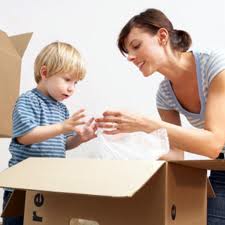 Moving With Kids
Moving With Kids
Moving can be very stressful for everyone, especially your kids. Regardless of their ages, packing, saying goodbye to friends and getting used to a new home and neighbourhood can be difficult.
The two weeks before and two weeks after a move tend to be the most stressful. However, it’s not until a month or so after the move that the reality of friends and places left behind starts to sink in and your children may become frustrated and angry. If you do encounter negative reactions, try to give your kids as much info about the move as possible, and be open to both good and bad reactions.
The good news is that there are several things you can do to get your kids involved early on and make moving a good experience for all. Download our FREE Moving Checklist to keep you on track with all that needs to be done to make your move as stress-free as possible.
 Future pace your kids
Future pace your kids
As soon as you know that you are moving, share it with the kids. This will give them lots of time to process it and plan their goodbyes. Be enthusiastic about moving and talk about all the great new places nearby (like the roller blade park and ice cream shop).
Do some research
Children thrive on predictability so eliminate as much of the unknown as possible at the start. The more they know about their new school, social activities, sports, and part-time job opportunities for older kids, the less anxious they’ll feel. Show your kids maps and photos.
Better yet, if possible, go explore the new neighbourhood together. You can go online and check out local events and happenings. If you are moving to the Markham area, Guiding Star is a great website listing all local events.
Discussing the move
The best way to prepare the kids to move is to talk about it. Involving kids in the planning as much as possible makes them feel like participants in the house-hunting process or the search for a new school. This can make the change feel less like it's being forced on them. You can access all area schools and school boards here.
For distant moves, provide as much information as you can about the new home and city (or country). Learn where kids can participate in favourite activities. See if a relative, friend, or even a real estate agent can take pictures of the new house and new school for your child. Moving in the winter can present special challenges. Read this to help you through it.
Tell your children that it is natural to feel apprehensive, and that they can talk about their unhappy feelings with you all they want. They can be angry, sad and scared. Allow your children ample time to say goodbye to their friends before your move. Make plans for how they can stay in touch with friends (e-mail, phone, visits, etc.)
After your move, even though you may be very busy adjusting to the transition yourself, get involved in your children's new schools so that you can get to know their teachers, fellow students, and other parents. Talking to other parents will probably be your best resource for age-appropriate activities, where to shop, must-do local events, and more.